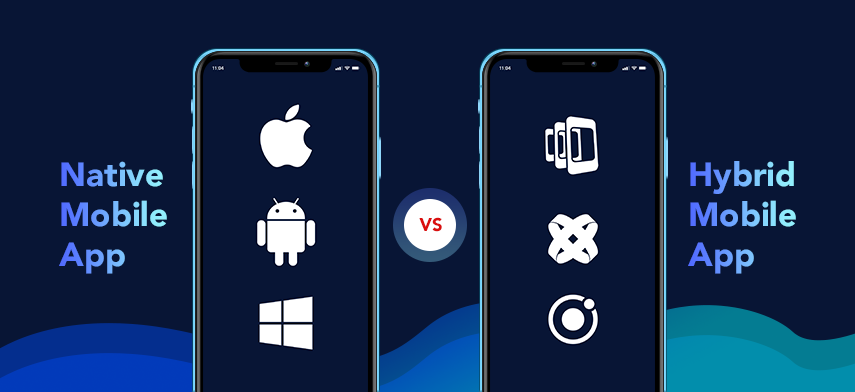In the dynamic landscape of app development, businesses are faced with a critical decision: What should they choose, native or hybrid for app development? As the quest for efficient and effective mobile solutions rises, businesses are demanding clarity on this subject.
In this blog post, we will delve into the nuances of Native and Hybrid app development, explore their pros and cons, and provide guidance to businesses on selecting the most suitable approach for their projects.
In contrast, a trusted Native App Development Company quotes, learn app development platforms before getting to develop the mobile application. So this blog guide you through the ins and outs of both approaches, helping you make the best decision for your unique needs.
Native Mobile Applications Overview
Native app development is designed specifically for a particular platform, such as iOS or Android. These apps are written in languages supported by the operating system, such as Swift or Objective-C for iOS and Java or Kotlin for Android.
Additionally, native apps have direct access to the device’s hardware and utilize the platform’s native features, providing a seamless user experience that feels like a natural extension of the device.
Hybrid Mobile Applications Overview
On the other hand, hybrid mobile applications are built using web technologies such as HTML, CSS, and JavaScript, and then wrapped in a native container. This allows the app to run on multiple platforms using a single codebase.
Moreover, hybrid apps provide developers with the advantage of writing code once and deploying it across various platforms, making them a cost-effective solution for businesses looking to reach a broader audience.
Pros of Native Mobile Apps
- Superior Performance: Native apps run directly on the device’s hardware, resulting in faster load times and smoother performance compared to hybrid apps.
- Access to Native Features: Native development grants access to a wide range of platform-specific features, such as GPS, camera, and push notifications, allowing developers to create more immersive and feature-rich experiences.
- Enhance User Experience: Native apps conform to the platform’s design guidelines, ensuring a consistent and familiar user interface, which leads to increased user satisfaction and engagement.
- Offline Functionality: Native apps can store data locally, enabling them to function without an internet connection, making them suitable for tasks that require offline access.
Cons of Native Mobile Apps
- Higher Development Costs: Building separate apps for different platforms can be cost-prohibitive, especially for smaller businesses with limited budgets.
- Longer Development Time: Developing separate apps for iOS and Android takes more time, potentially delaying the app’s time-to-market.
- Skill Set Requirements: Native app development requires specialized knowledge in platform-specific languages, which may necessitate hiring dedicated developers for each platform.
Pros of Hybrid Mobile Apps
- Cost-Effective: Using a single codebase for multiple platforms reduces development costs, making hybrid apps attractive options for businesses with tight budgets.
- Faster Development: Writing code once and deploying it across platforms speeds up development time, allowing businesses to launch their apps sooner.
- Simplified Maintenance: Maintaining a single codebase simplifies the update process, as changes can be implemented universally.
- Cross-Platform Compatibility: Hybrid apps can run on both iOS and Android devices, widening the app’s potential user base.
Cons of Hybrid Mobile Apps
- Performance Limitations: Hybrid apps rely on web technologies and an additional layer for native functionality, which can lead to slightly slower performance compared to native apps.
- Limited Native Features: Access to advanced platform-specific features may be restricted, preventing the app from fully utilizing the capabilities of each device.
- User Experience Challenges: Achieving a seamless user experience across platforms can be challenging due to inherent differences in design guidelines and user interface elements.
Factors to Consider When Choosing the Right Approach
Project Requirements and Scope
The complexity of the project and its specific requirements play a significant role in deciding the development approach. If the app requires extensive access to native features and a high level of performance, native app development may be the preferred option.
On the other hand, for simpler apps with more straightforward functionality, hybrid development can be a cost-effective and efficient choice.
Development Time and Cost
Businesses must consider their budget and timeline when deciding between native and hybrid development. While native apps generally offer better performance and user experience, they tend to have higher development costs and longer timelines.
Hybrid apps, on the other hand, can be more budget-friendly and quicker to develop.
User Experience and Performance
If delivering a top-notch user experience and maximizing app performance is paramount, native development is the way to go. Native apps’ direct access to hardware and platform-specific features ensures smoother performance and a more polished user interface.
However, for less demanding applications, hybrid apps can still provide satisfactory user experiences.
Platform and Device Support
Consider the target audience and the devices they are most likely to use. If the app needs to reach a broad audience across multiple platforms. So a hybrid approach can be advantageous.
However, if you are targeting a specific platform or requires in-depth integration with a particular device’s features, native development may be the better choice.
Making the Decision: Native vs. Hybrid
Use Cases for Native App Development
- Gaming and Graphics-Intensive Apps: For apps that require high-performance graphics and complex animations, native development is crucial to achieving smooth gameplay and engaging visuals.
- Multimedia and Content Consumption Apps: Apps that heavily rely on media content, such as streaming services or e-learning platforms, benefit from native development to provide seamless playback and user interaction.
Use Cases for Hybrid App Development
- Business and Utility Apps: Hybrid apps are well-suited for business and utility applications that require straightforward functionality, such as internal communication tools or task management apps.
- Content Publishing Apps: Apps focused on content delivery, such as news aggregators and blogs, can be efficiently developed using hybrid frameworks to cater to a broad audience across platforms.
Final Thoughts
Choosing the right approach for mobile app development is a critical decision that significantly impacts an app’s success. Native app development offers superior performance and access to native features, making it ideal for complex and performance-critical apps.
On the other hand, hybrid app development provides cost-effectiveness and cross-platform compatibility, making it a suitable choice for simpler apps targeting a broad audience.
Ultimately, the decision should be based on the specific project requirements, budget constraints, target audience, and desired user experience. Businesses should weigh the pros and cons of each approach and consider the long-term goals of their app to make an informed decision.
For businesses seeking a top-tier native app development company that can significantly enhance the app’s success. Moreover, the expertise and proficiency of a native app development company ensure businesses about the full potential of native features and provide users with a seamless and captivating mobile experience.
By carefully evaluating the project’s needs and aligning them with the right development approach, businesses can create remarkable mobile apps that leave a lasting impact on their audience, fostering growth and success in the digital realm.



